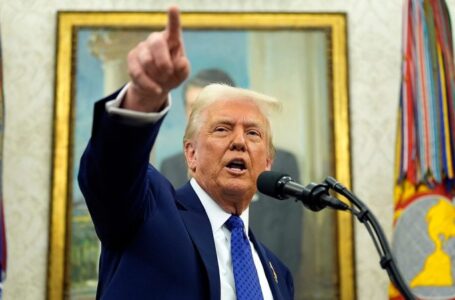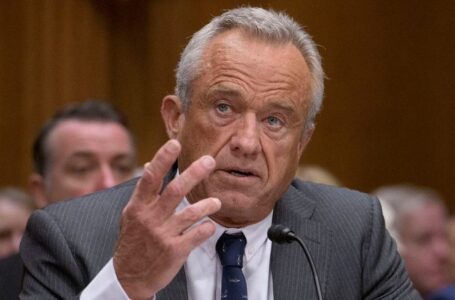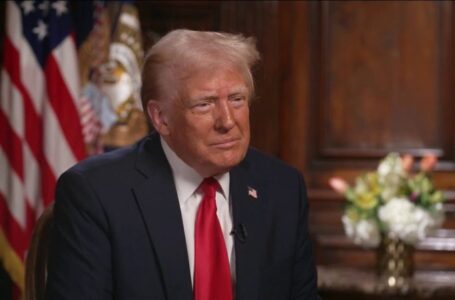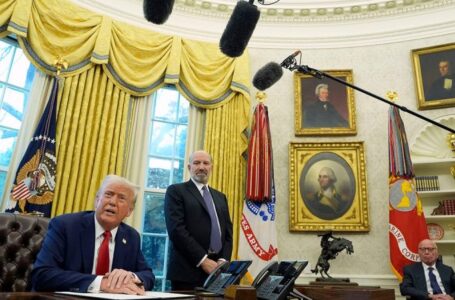Many GOP billionaires balked at Jan. 6. They’re coming back to Trump.
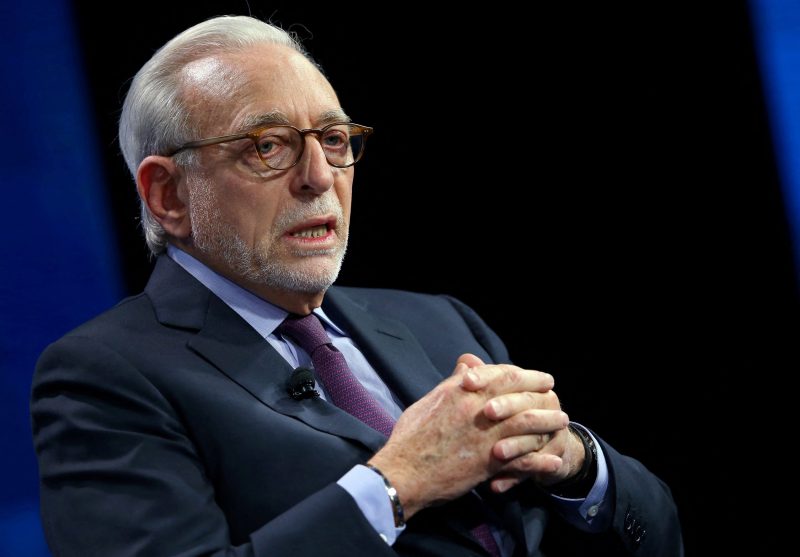

The day after pro-Trump forces stormed the Capitol on Jan. 6, 2021, billionaire and GOP megadonor Nelson Peltz called the attempted insurrection a “disgrace” and expressed remorse for voting for Donald Trump. “I’m sorry I did that,” Peltz said of supporting Trump in 2020.
But earlier this month, Peltz had breakfast with Trump and other billionaires at his luxurious Palm Beach oceanfront mansion, including hotelier Steve Wynn, Tesla and X CEO Elon Musk and former Marvel chairman Isaac Perlmutter, according to people with knowledge of the meeting, who spoke on the condition of anonymity to describe the private meeting. Peltz, a famous activist investor currently in a battle over Disney, then told the Financial Times that he would “probably” vote for the GOP front-runner in 2024. The New York Times first reported that Trump dined with Musk and other donors but did not name Peltz, Wynn or Perlmutter.
As hopes of a Republican alternative have crumbled, elite donors who once balked at Trump’s fueling of the Capitol insurrection, worried about his legal problems and decried what they saw as his chaotic presidency are rediscovering their affinity for the former president — even as he praises and vows to free Jan. 6 defendants, promises mass deportations and faces 88 felony charges.
The shift reflects many conservative billionaires’ fears of President Biden’s tax agenda, which if approved would drastically reduce their fortunes, and in some cases their discomfort with his administration’s foreign and domestic policy decisions. Some also have been assiduously courted by Trump and his advisers in recent months.
“If it starts to look like Trump may win, despite his legal troubles, it is inevitable that Republican business people who have not been fans will open their wallets in self-defense,” said Kathryn Wylde, the CEO of the Partnership for New York City, the top lobbying group for major corporations in New York.
Democrats argue these billionaires are making their personal fortunes their top priority. Biden has promised to raise many taxes on the rich, including the capital gains rate paid on investment income and a new 25 percent tax specifically on billionaires. These efforts were stymied in his first administration, but the president would try again.
“The billionaire class is really threatened by Biden: These guys are about creating a dynasty of wealth for themselves, and hoarding it for their posterity, at the expense of everyone else in society,” said Steve Rosenthal, senior fellow at the Tax Policy Center, a nonpartisan think tank. “That’s the striking story at the moment.”
Some of these donors are not enthusiastic supporters of Trump — they wanted other candidates and still express misgivings about Trump and his ability to win a general election. “This isn’t a passionate embrace. It’s just reality,” one person close to major donors said. “No one is particularly excited about it.”
Trump’s team has used a soft touch with the billionaires and has shown more sophistication than some expected, according to a person with knowledge of the talks, who like others spoke on the condition of anonymity to reveal details of the interactions. At the center of some of the discussions has been top Trump aide Susie Wiles, this person said, who often comes armed with data and is viewed as “impressive and professional,” a person who heard her pitch said. Trump is also growing his fundraising team in Palm Beach, where Republican National Committee employees and others are expecting to move to raise money.
“She has given some of the donors a reason to feel better about it,” this person said, who listened to her pitch. When one wealthy donor asked about whether Trump could win suburban and independent voters in a Palm Beach meeting, she was armed with slides and data, this person said.
And at Wiles’s suggestion, Trump himself has engaged in “call time,” where he dials billionaires himself. In the past, he had been resistant to such measures.
Trump could desperately use the cash infusion as his campaign and RNC trails Biden and the Democratic National Committee, and he faces growing legal bills. Next month, he is planning a fundraiser being hosted by a range of billionaires, including oil billionaire Harold Hamm, sugar magnate Jose “Pepe” Fanjul, real estate mogul Howard Lutnick, megadonors Rebekah and Bob Mercer, billionaire business executives Todd Ricketts and Warren Stephens, real estate magnate Steve Witkoff and others, according to an invitation reviewed by The Washington Post. The price of admission is $250,000, but many donors are giving the maximum contribution of $814,600 — which will be split between Trump’s campaign and other entities, including the Republican National Committee and a leadership PAC that pays many of his legal bills. It is being hosted by John Paulson, a billionaire investor backing Trump. Giving $814,600 gets a seat at Trump’s table.
A Trump adviser said the event is expected to raise about $33 million. Trump advisers said that while they expect to not have as much money as Biden’s campaign and the DNC, they believe they can close the gap.
“We are not only raising the necessary funds but we are deploying strategic assets that will help send President Trump back to the White House and carry Republicans over the finish line,” said Trump campaign spokesman Steven Cheung.
Wynn has helped orchestrate some of the conversations. Wynn and Trump talk regularly. Trump has in recent months complained that Wynn has not given him a dollar even though they have been friends for years, according to people familiar with the remarks. Now, Wynn is headlining the fundraiser as well.
Blackstone CEO Steve Schwarzman, who rejected Trump in the 2024 GOP primary, is now considering backing the former president, people familiar with the matter said. A top adviser to Schwarzman has spoken to multiple Trump advisers in recent weeks, according to people familiar with the matter, but Schwarzman has not made a final decision on giving.
Oracle’s Larry Ellison — a billionaire who backed Sen. Tim Scott (R-S.C.) and former U.N. ambassador Nikki Haley in the GOP primary — is in discussions about writing a large check in support of Trump, people familiar with the matter said. Trump and his aides have courted Ellison in recent weeks. Richard Uihlein and Elizabeth Uihlein, conservative billionaires and heirs to the Schlitz brewing fortune, told the Financial Times that they will donate to Trump as well.
Spokespeople for Ellison and Schwarzman declined to comment or did not return a request for comment. A call to the law firm that represents Wynn was also not returned.
Perlmutter, a prominent billionaire at Mar-a-Lago, is working on an outside group to support the president, according to people familiar with his activities.
There are some holdouts. Citadel CEO and billionaire Ken Griffin remains resistant to giving money to Trump and has told others he does not have plans to fall in line with Trump, according to people who have spoken to him. Billionaire investor Peter Thiel, at one time Trump’s biggest backer in Silicon Valley, still plans to stay out of politics this cycle, and has rebuffed efforts from Trump’s team to garner support, said a person familiar with his thinking, who spoke on the condition of anonymity to describe his views.
In Silicon Valley, some members of an influential cohort of right-leaning tech investors and leaders who were alienated by Trump’s election-fraud crusade and the Jan. 6, 2021, attack appear to be coming around to him. Many have been put off by Biden’s campaigns against the wealthy, as well as his administration’s criticisms of the tech industry in particular and its efforts to regulate the artificial intelligence boom.
David Sacks, a prominent tech investor, former COO of PayPal, and host of the popular All-In podcast, spent the bulk of last year giving support to candidates running against Trump. He partnered with Florida Gov. Ron DeSantis (R) to launch his presidential campaign on Twitter last spring, and later threw fundraisers for candidates Robert F. Kennedy and Vivek Ramaswamy in the fall. Privately, he had told associates that he was not a believer in Trump’s election fraud crusade and was searching for a more disciplined candidate. But recently, Sacks has begun to noticeably praise Trump to his more than 800,000 followers on X. In one recent post, referring to him as an “indispensable figure,” praising him for the “massive crowds he draws,” and for going “over the heads of the media.” In another, Sacks wrote, “Keep ridiculing [Trump] if you want, I’m going to cut him some slack.”
A spokeswoman for Sacks, Jessica Hoffman, declined to comment on his views.
Joe Lonsdale, co-founder of data-mining firm Palantir and an associate of Sacks, Thiel, and other billionaires on the right, was never a vocal Trump supporter. He backed DeSantis and threw a fundraiser for Ramaswamy. This week, Lonsdale told The Washington Post that he planned to vote for Trump because he preferred Trump’s policies to Biden’s. But he said he would not be a heavy donor to any candidate this cycle and that he would stay focused on advocating for policy changes at the state level.
Other business elites once alarmed by Trump’s illiberal tendencies have softened their criticisms. Gary Cohn — a top economic aide in Trump’s White House who quit in 2018 over issues including tariffs and the president’s response to the deadly White nationalist march in Charlottesville — recently sounded positive notes about the former president. A former Goldman Sachs executive who is now vice chair of IBM, Cohn told CBS News of the 2024 election: “I think the business community at this point is still open-minded. The business community wants to hear the policies.”
Some of the billionaires who have flipped were particularly outspoken in their criticism of Trump three years ago, at the height of public outcry over the Capitol riot. After Jan. 6, billionaire developer Robert Bigelow said Trump had “lost me as a supporter … He showed that, in that particular hour, he was no commander.” Bigelow has pledged $20 million to a pro-Trump campaign group and has given $1 million to cover the president’s legal costs, according to Reuters. His firm did not respond to a request for comment.
Hamm had expressed disapproval of Trump’s handling of Jan. 6 and said that the country needed a “clean slate.” Hamm started donating to Trump last year and is expected to continue to do so now. He often rants, according to people know him, about Biden’s energy and electric car policies, and had a private meeting with Trump at Mar-a-Lago in recent months. Hamm is also headlining the fundraiser.
The arrival of the big money cavalry comes at an auspicious time for Trump. He is on the hook for a $175 million bond in a New York civil fraud case, and the campaign has so far lagged Democrats in raising money.
The calculus on whether to support Trump is not always straightforward. One Trump fundraiser, speaking on the condition of anonymity to describe private conversations, said many GOP billionaire donors can face blowback from their family members for supporting the former president, along with employees and clients. This fundraiser also pointed out that it’s not clear to what extent GOP billionaires who backed other candidates in the primary will have Trump’s ear if reelected, depending on the size of the check they cut.
But the financial upside of going with the former president may win out.
Trump has also discussed further cutting the corporate tax rate, and toyed in his first administration with unilaterally lowering the capital gains rate paid by investors.
“The Biden tax increase is really viewed with hostility by the people on Wall Street I talk to, even some of the more moderate Republicans on Wall Street who have typically not been conservative in their orientation,” said Stephen Moore, an outside economic adviser to Trump. “The higher rate on capital gains, the higher corporate rate — all that stuff is anathema to these people.”


